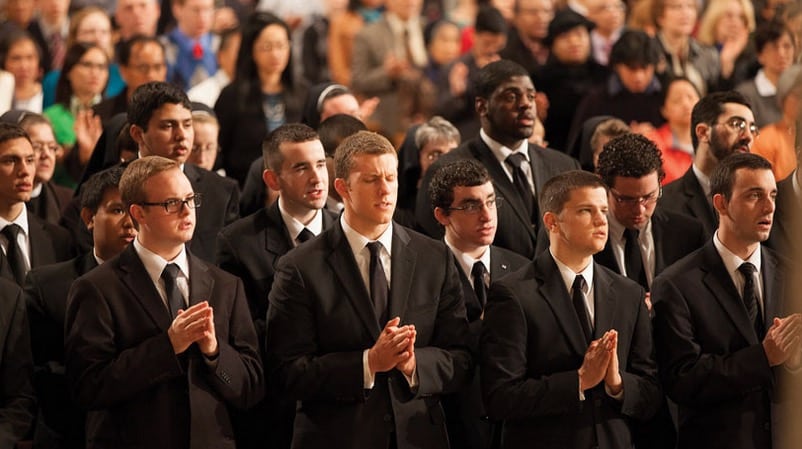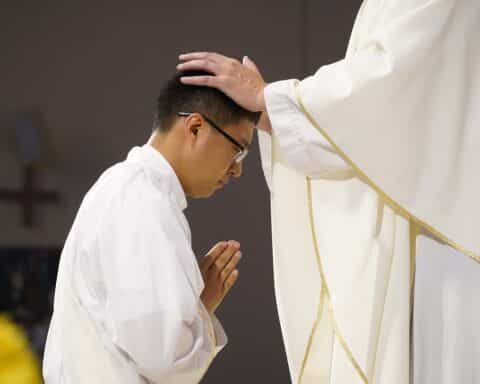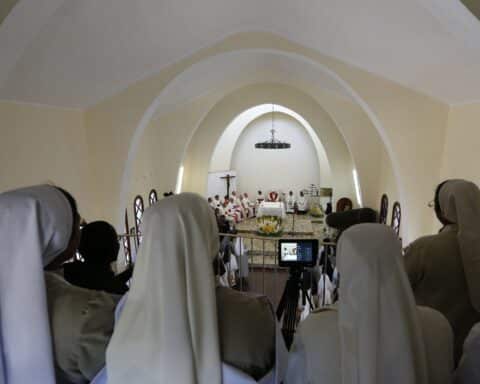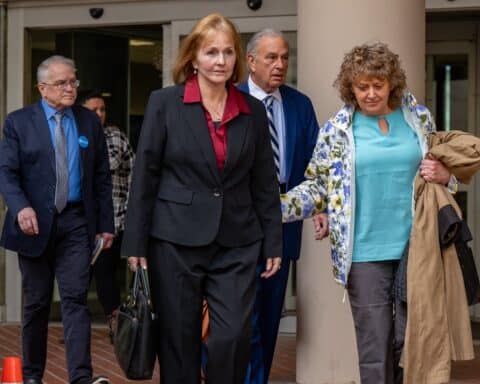More than a decade after the priest sex abuse crisis shook the Catholic Church from its pews to the altar, American seminaries increasingly are focusing on forming the man before forming the priest, according to rectors and staff psychologists at seminaries across the United States.
Seminary applicants today undergo screening that includes written psychological tests and intensely personal interviews to determine if their emotional development is appropriate to their age. Such screenings show what further growth they need to serve as a priest or whether they are afflicted by serious mental health issues that should prevent them from priestly formation.
“You have the human, the spiritual and the academic to consider,” said Father Troy Przybilla, director of vocations for the Archdiocese of St. Paul and Minneapolis in the vocations office at The St. Paul Seminary at St. Thomas University in St. Paul. “In the personal interviews for applicants we are looking at human formation: Where is this guy at? Does he seem like a real person? Does he interact well? Can he carry a conversation? Is there something off about the guy? Is something not right? If it is not a mental illness, then what is going on?”
Continuing scandal
What is going on with the men who profess a calling to the priesthood is a critical determination that the nation’s seminaries stake their reputations on. With the shadow of the priest sex abuse crisis still hovering like a dark cloud over the Church, recent disclosures of sexual abuse by clergy in the St. Paul and Minneapolis archdiocese, as well as in the Archdiocese of Chicago, has brought the scandal back into the news and raised questions about what seminaries are doing to prevent it from happening again.
|
“Our society has malformed, and it has a tendency to malform us, so someone who has a tendency to be malformed must be identified at the beginning of the process to enter a seminary,” Father Przybilla told Our Sunday Visitor. “For our diocese that is particularly important coming at this time. People are asking of the seminary, ‘Are they doing their job?'”
In December, the Minnesota archdiocese released the names of 30 priests that it suspects, based on “substantiated claims,” sexually abused children over six decades up to 2013. This month the Chicago archdiocese, as part of lawsuit settlements with abuse victims, released 6,000 pages of documents that identified 30 priests whom the Church found had sexually abused children and subsequently covered up. Church officials contend most of the abuse occurred before 1988 and up to 1996.
Prevention tactics
| Processes |
|---|
|
Dr. Christina Lynch, Director of Psychological Services at St. John Vianney Theological Seminary in Denver, said the following testing instruments are standardized and are in use at most seminaries: – Clinical interview with an in-depth family history
– School history
– Social and sexual history (dating and friendships)
– Extracurricular activities
– Behavioral issues (such as pathological guilt or perfectionism)
– Wechsler Adult Intelligence Scale or Wechsler Abbreviated Scales of Intelligence
– Rorschach Inkblot Test
– Internet sex screening test
– Background questionnaire concerning sexual misconduct
– Social media questionnaire usage — asking about all types of all media, including TV/Internet/social media, and what do they use the Internet for?
|
All Catholic seminaries in the United States submit applicants to a comprehensive psychological assessment, which helps the candidate and seminary faculty gain a greater understanding of development, psychological and other personal factors at work in the life of the candidate, and how these may strengthen or hinder an authentic vocational discernment, said Dr. Fernando Ortiz, director of the Counseling Center at Gonzaga University in Spokane, Wash., who does the psychological evaluations for many prospective seminarians in the Northwest who have applied to enter Bishop White Seminary at Gonzaga.
The evaluation is done by professional clinicians, and often the resulting psychological report identifies areas that need to be more fully screened or identifies features that raise serious concern or further discernment by others, Ortiz said.
“Responsible psychological assessment, as required by the Catholic Church, usually consists of several clinical interviews and testing sessions comprising a battery of tests selected to serve specific areas of assessment,” Ortiz said. “As a screening instrument the psychological assessment can provide information in regard to three of the four pillars of formation: human, intellectual and pastoral. The assessment focuses on evaluating the candidates’ mental health history, treatment history (if any), problem behaviors, any history of trauma, family mental health history, family history, developmental history, academic history, sexual history, relational history and vocational background.”
Not all problems call for disqualification, said Dr. Michael Hansen, a psychologist in Narragansett, R.I., who is employed part time by the Diocese of Providence at Our Lady of Providence Seminary in Providence.
“What we would look for in applicants is an individual openness to be formed, to be working with their personality,” Hansen said. “As long as there are no serious impediments they would be accepted. This is a college program [seminarians attend Providence College or Rhode Island College where they earn bachelor degrees], so some of our candidates have just graduated from high school, 18 years old, so there is a lot of room for further development at that stage. They will be in a seminary for eight years of formation and study for the priesthood.”
Sexuality screening
The looming question is one that likely was ignored decades and unasked: Is the candidate a homosexual?
“In the area of human sexuality there is much more attention paid to that today than there has been in the past,” Hansen said. “Normal sexual attraction wasn’t dealt with then. Now it is on the table. We ask candidates, ‘Could you talk about your sexual orientation?’ If the candidate says, ‘My orientation is homosexual,’ a number of questions will follow. They will be asked about their sexual history. The candidates are asked to share their sexual experiences. The goal in that is to make a determination. How recently has the candidate been sexually involved in those experiences?”
In deciding on a candidacy, much “depends on how integrated one’s sexual orientation is to chaste celibacy. If a candidate identifies as homosexual, but there is no sexual experience, and if he is accepting of that and has no strong proclivity to act on it,” admission would be possible, he said.
St. John Vianney Theological Seminary in Denver, like most seminaries, has a psychologist on its staff. Dr. Christina Lynch is the director of Psychological Services. She said the outcome of the psychological testing for candidates by both their own diocesan vocation office and the seminary is to produce well-adjusted priests.
“The current effect the testing is having at SJV is to permit a system which helps admission teams determine if a man is suitable for candidacy and, if so, permits a process whereby formation advisers can develop concrete steps for growth,” Lynch said. “The result is that the majority of the men accepted in formation at SJV are open to growth and willing to seek help when needed, first in their life’s journey toward holiness, then priesthood.”





